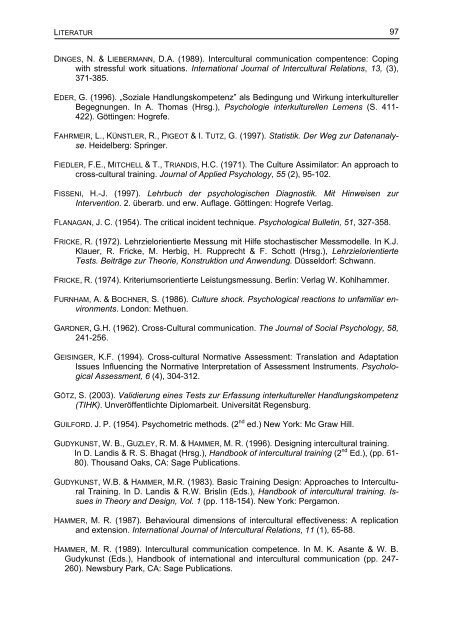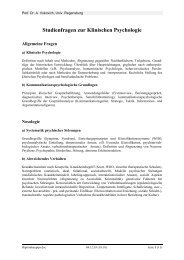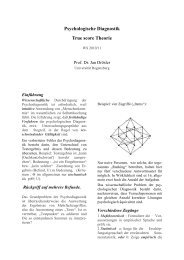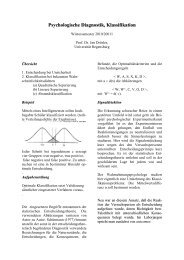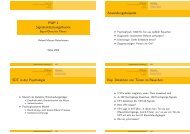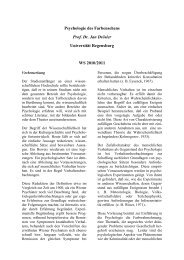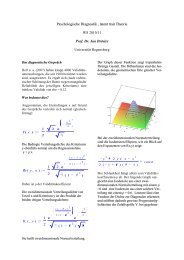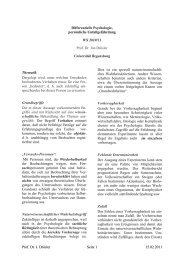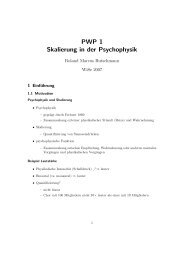Entwicklung eines Tests zur Erfassung interkultureller ...
Entwicklung eines Tests zur Erfassung interkultureller ...
Entwicklung eines Tests zur Erfassung interkultureller ...
Erfolgreiche ePaper selbst erstellen
Machen Sie aus Ihren PDF Publikationen ein blätterbares Flipbook mit unserer einzigartigen Google optimierten e-Paper Software.
LITERATUR 97<br />
DINGES, N. & LIEBERMANN, D.A. (1989). Intercultural communication compentence: Coping<br />
with stressful work situations. International Journal of Intercultural Relations, 13, (3),<br />
371-385.<br />
EDER, G. (1996). „Soziale Handlungskompetenz” als Bedingung und Wirkung <strong>interkultureller</strong><br />
Begegnungen. In A. Thomas (Hrsg.), Psychologie interkulturellen Lernens (S. 411-<br />
422). Göttingen: Hogrefe.<br />
FAHRMEIR, L., KÜNSTLER, R., PIGEOT & I. TUTZ, G. (1997). Statistik. Der Weg <strong>zur</strong> Datenanalyse.<br />
Heidelberg: Springer.<br />
FIEDLER, F.E., MITCHELL & T., TRIANDIS, H.C. (1971). The Culture Assimilator: An approach to<br />
cross-cultural training. Journal of Applied Psychology, 55 (2), 95-102.<br />
FISSENI, H.-J. (1997). Lehrbuch der psychologischen Diagnostik. Mit Hinweisen <strong>zur</strong><br />
Intervention. 2. überarb. und erw. Auflage. Göttingen: Hogrefe Verlag.<br />
FLANAGAN, J. C. (1954). The critical incident technique. Psychological Bulletin, 51, 327-358.<br />
FRICKE, R. (1972). Lehrzielorientierte Messung mit Hilfe stochastischer Messmodelle. In K.J.<br />
Klauer, R. Fricke, M. Herbig, H. Rupprecht & F. Schott (Hrsg.), Lehrzielorientierte<br />
<strong>Tests</strong>. Beiträge <strong>zur</strong> Theorie, Konstruktion und Anwendung. Düsseldorf: Schwann.<br />
FRICKE, R. (1974). Kriteriumsorientierte Leistungsmessung. Berlin: Verlag W. Kohlhammer.<br />
FURNHAM, A. & BOCHNER, S. (1986). Culture shock. Psychological reactions to unfamiliar environments.<br />
London: Methuen.<br />
GARDNER, G.H. (1962). Cross-Cultural communication. The Journal of Social Psychology, 58,<br />
241-256.<br />
GEISINGER, K.F. (1994). Cross-cultural Normative Assessment: Translation and Adaptation<br />
Issues Influencing the Normative Interpretation of Assessment Instruments. Psychological<br />
Assessment, 6 (4), 304-312.<br />
GÖTZ, S. (2003). Validierung <strong>eines</strong> <strong>Tests</strong> <strong>zur</strong> <strong>Erfassung</strong> <strong>interkultureller</strong> Handlungskompetenz<br />
(TIHK). Unveröffentlichte Diplomarbeit. Universität Regensburg.<br />
GUILFORD. J. P. (1954). Psychometric methods. (2 nd ed.) New York: Mc Graw Hill.<br />
GUDYKUNST, W. B., GUZLEY, R. M. & HAMMER, M. R. (1996). Designing intercultural training.<br />
In D. Landis & R. S. Bhagat (Hrsg.), Handbook of intercultural training (2 nd Ed.), (pp. 61-<br />
80). Thousand Oaks, CA: Sage Publications.<br />
GUDYKUNST, W.B. & HAMMER, M.R. (1983). Basic Training Design: Approaches to Intercultural<br />
Training. In D. Landis & R.W. Brislin (Eds.), Handbook of intercultural training. Issues<br />
in Theory and Design, Vol. 1 (pp. 118-154). New York: Pergamon.<br />
HAMMER, M. R. (1987). Behavioural dimensions of intercultural effectiveness: A replication<br />
and extension. International Journal of Intercultural Relations, 11 (1), 65-88.<br />
HAMMER, M. R. (1989). Intercultural communication competence. In M. K. Asante & W. B.<br />
Gudykunst (Eds.), Handbook of international and intercultural communication (pp. 247-<br />
260). Newsbury Park, CA: Sage Publications.


